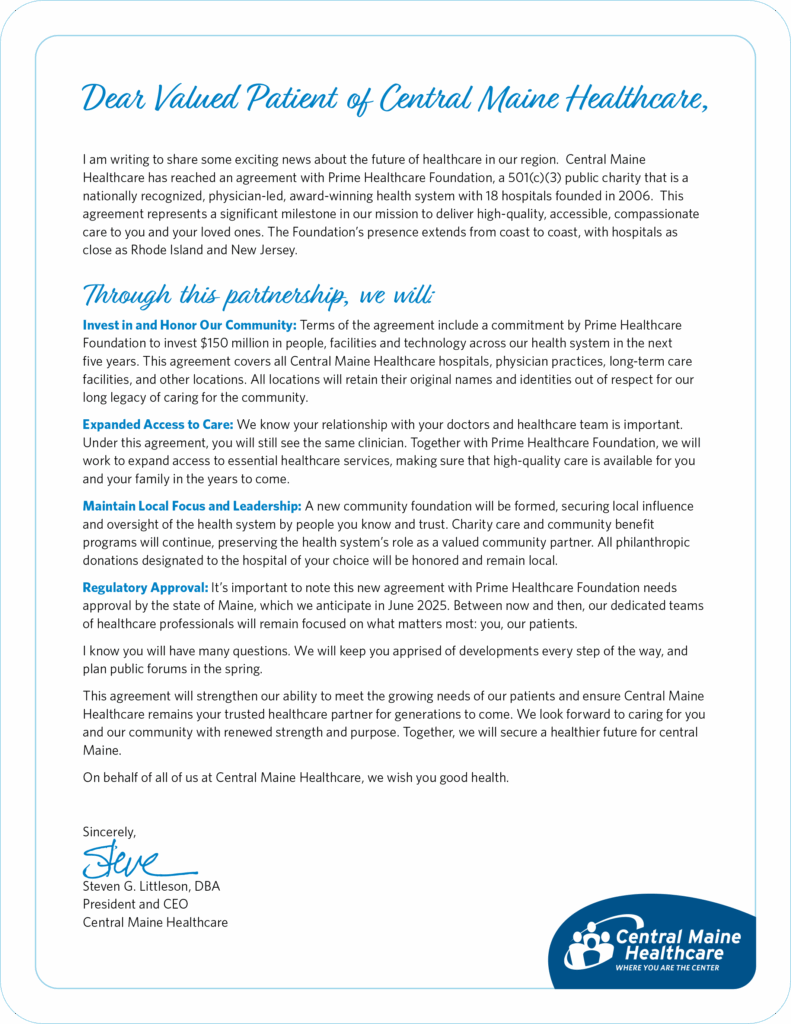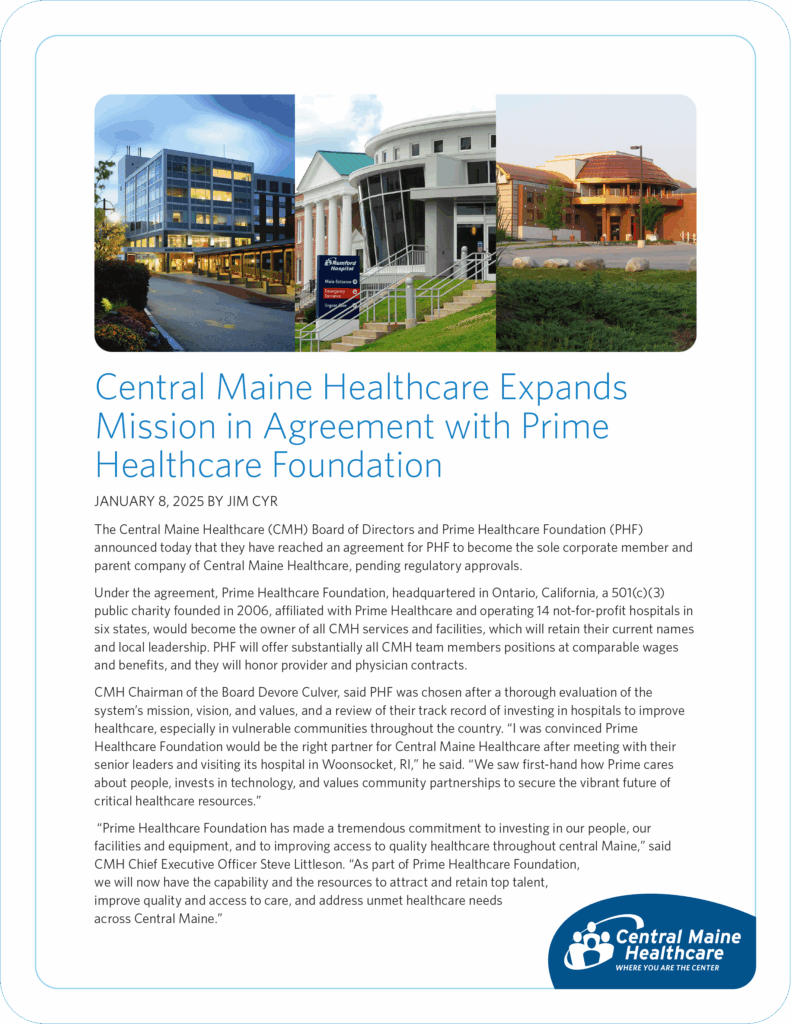Central Maine Healthcare
Therapy Specialty Programs
Orthopedic/Musculoskeletal Rehabilitation: Therapists use a range of treatment approaches to help regain function. Services include therapeutic exercise, manual therapy and customized home programming instruction for patients recovering from:
| Sprains and strains Tendonitis Bursitis | Amputation Arthritis Headache | Temporo-mandibular joint (TMJ) dysfunction |
Back and Spine Care: Physical therapists with specialized training will guide the patient’s active recovery and help them acquire skills for self-management of their spinal conditions:
- Manual skills for symptom relief
- Therapeutic exercise instruction addressing posture, range of motion, flexibility, strength and coordination issues
- Functional restoration and conditioning programming that assists to resume activities of daily living, work activities or recreation
- Creating a plan for life at home, to optimize recovery and prevent aggravation of the spine problem
Post Surgical Rehab – Continuing Rehab after Hospitalization: Our therapists provide outpatient rehab services to patients after hospital discharge. We support patients following:
| Total joint replacement Surgery for sports injuries Spine surgery | Trauma rehabilitation Hand/upper extremity surgery Reconstructive surgery |
CMTS therapists communicate closely with the patient’s surgeon to support an optimal outcome for the patient.
Balance and Vestibular Program: This program seeks to decrease dizziness and improve balance for those who feel unsteady or experience dizziness, positional vertigo, lightheadedness or spinning, or may have experienced a fall.
Work Injuries: CMTS therapists offer services to support the injured worker, which include:
- Acute injury treatment focused on active, timely recovery
- Ergonomic review/work risk analysis
- Education and training to prevent re-injury
- Work conditioning, restoring abilities to perform work
Hand and Upper Extremity Therapy: CMTS therapists support a comprehensive range of hand and upper extremity conditions including:
| Repetitive motion disorders Post fracture of hand, wrist/upper extremity Sports injury of hand, wrist/upper extremity Sprains and strains | Burns Trauma rehabilitation Hand/upper extremity surgery Reconstructive surgery |
Treatment services include:
| Splinting Pain management Joint protection Post surgical care Therapeutic exercise to regain range of motion and strength | Work simulation/job task analysis Scar management Desensitization Customized adaptive equipment to support activities of daily living |
Lymphedema Management: Lymphedema is the abnormal accumulation of lymphatic fluid under the surface of the skin, causing swelling in the limbs. We focus on:
| Controlling or reducing lymphedema symptoms Decreasing pain | Increasing independence in self-care Improving mobility Long term self-management |
Treatment consists of:
| Lymphatic massage Compression bandaging Exercise | Skin care training Compression garment fitting |
Pelvic Floor Rehab – Bladder Control–Incontinence Management: Physical therapists with specialized training provide treatment and training support to women, men and children:
| Urinary and fecal incontinence Urinary urgency Urinary frequency Constipation Overactive bladder | Pelvic pain: difficulty with sitting, pain with intercourse and pain of the hip, lower back and lower abdomen Pregnancy/postpartum incontinence/pain Pelvic organ prolapse |
Specific treatment and training is identified for the individual patient:
| Bowel and bladder training Biofeedback Soft tissue mobilization | Pelvic floor muscle training Planning and support for self-management at home |
Swallowing Therapy: Speech pathologists partner with primary care providers to assess swallowing functioning and develop a treatment plan:
- Exercises to improve muscle control and strength
- Compensatory strategy training to compensate for deficits
- Facial, oral and pharyngeal exercise in conjunction with electrical stimulation
- Neuromuscular electrical stimulation (VitalStim) to retrain swallow
- Patient training regarding diet consistency strategies to reduce health risks
- Food preparation instruction
The goal of swallow/dysphagia therapy is to reduce the risk of aspiration and improve swallowing function, allowing the patient to consume food and liquid in a variety of consistencies. Patients may benefit if they have experienced:
| Stroke Traumatic brain injury Head and neck cancer Neurological diseases | Respiratory diseases Facial paralysis Post polio syndrome |
Adult Speech/Language Therapy: Speech language pathologists evaluate and treat adult speech and language disorders, including:
Voice: Vocal changes, vocal cord dysfunction and difficulty with vocal quality and loudness. The goal of therapy is to increase optimal vocal pitch, appropriate loudness, resonance, optimizing breathing style, pacing for speech production and vocal hygiene programming.
Fluency: The goal is to decrease or eliminate fluency difficulties, excessive upper body/ laryngeal tension and provide fluency-enhancing strategies.
Dysarthria and Apraxia: The goal of therapy is to develop functional speech strategies and/or determine if speech-based therapy tools would improve communication, which may include technical augmentative communication devices or speech generating devices. Therapy supports communication skills for home, work and community environments.
Pediatric Speech/Language Therapy: Speech therapists work closely with parents, pediatricians and CDS to evaluate and treat all aspects of early communication skills, including comprehension of spoken language, verbal expression, pragmatics/social language skills, articulation/sound production skills, fluency and voice. The goal is to help children attain the communication skills required in education and social settings.
Osteoporosis Program: Therapists design safe exercise and activity programs to improve an individual’s strength, balance and overall function. A customized home program is designed to help decrease bone loss and lower the risk of falls or fractures.
Neurological Rehabilitation: Our team of physical therapists, occupational therapists and speech-language pathologists work closely with inpatient rehab facilities to support a smooth transition to the outpatient phase of care. Therapy is focused on supporting the patient’s continued effort to regain function:
| Brain injury Post-concussive syndrome Stroke Parkinson’s disease | Multiple sclerosis Spinal cord injury Other neurological conditions |
Rehab programming focuses on enhancing challenging areas of function:
| Self-care Mobility Cognition | Balance Communication Swallowing |
You may require a combination of multiple therapies to find relief and restore abilities. Your therapeutic care plan will outline what is needed and evolve to meet your changing needs.
Planned Giving
Planned giving is a way to contribute to Central Maine Medical Center, Bridgton Hospital or Rumford Hospital through charitable donations made as part of your financial or estate planning. These gifts allow you to support our mission in a meaningful way, while also potentially providing financial benefits to you and your loved ones.
Please let us know if you have already included Central Maine Healthcare in your estate planning, or if you are considering doing so. Thank you.
Planned gifts can come in many forms, including:
Retirement Plans: You can designate a Central Maine Healthcare hospital as a beneficiary of your 401(k), IRA, or other retirement accounts, which may provide tax benefits to you or your estate.
Bequests: A gift made through your will or living trust. You can designate a specific amount or percentage of your estate to support one of our hospitals.
Charitable Gift Annuities: In exchange for a donation, you receive fixed, regular payments for life, and the remaining gift goes to one of our hospitals after your passing.
Charitable Remainder Trusts: These allow you to transfer assets into a trust, receive income during your lifetime, and designate the remainder to benefit one of our hospitals.
Life Insurance: By naming [Hospital Name] as the beneficiary of a life insurance policy, you can make a significant future gift while maintaining your premiums during your lifetime.
How to Start Your Planned Giving Journey
Consult with Your Financial Advisor
We recommend working with your financial advisor to determine the best type of planned gift for your financial situation and goals.
Contact Our Office of Philanthropy
We can provide resources, including sample bequest language, and connect you with legal and financial professionals if needed.
Make Your Gift
Once you’ve decided how you’d like to give, we will work with you to ensure that your gift is set up in a way that fulfills your wishes and benefits the hospital.For more information on planned giving, including guidance on how to shape your bequest language, please reach out to:
Lisa LaVallee
Phone: (207) 795-2685
Email: giving@cmhc.org
Together, we can help you make a meaningful difference.
Plastic and Reconstructive Services
Aesthetic Enhancements
The goal of all aesthetic enhancements is to improve the skin and facial appearance. However, there are many different types and choosing the right enhancements for you can be a confusing process.
Options to Look and Feel Your Best
Botox® is a protein that is injected to facial areas with deep lines to relax or paralyze the muscle and smooth wrinkles. The injections are used with a very fine needle, and do not require anesthesia. The Botox® treatment lasts three to six months depending on the individual.
Fillers are injectables used to restore volume loss. Central Maine Healthcare offers many different types for different areas of the face.
- Juvéderm®: an injectable filler containing hyaluronic acid, which is a complex sugar naturally occurring in the body that decreases with age. It improves the skin’s elasticity and may be used to improve deep skin folds and to enhance lips. Treatments usually last six months to a year, depending upon the individual.
- Voluma® XC: the first and only FDA-approved injectable gel that can instantly add volume to your cheek area. Its effects can last up to two years with optimal treatment.
- Kybella®: the first and only FDA-approved “double chin” treatment. This filler is an injection of deoxycholic acid, which can improve the appearance and profile of moderate to severe fat under the chin.
Traditional Skincare: These services are likely the ones you’re most familiar with and can sometimes be found in spas. Central Maine Healthcare provides superior results over spas because of our medical grade equipment and product, as well as our highly trained team members.
- Microdermabrasion: finely crushed diamonds expertly remove dead skin on the surface of the face. This procedure is ideal for fine lines, wrinkles, hyperpigmentation, acne, scarring and overall exfoliation. It requires no down-time.
- Skin Peels: a solution to the face, neck or hands for exfoliations. Also known as chemical peels, these treatments are a several-step process that may require several visits. The goal is to make the skin appear smoother and younger by removing a variety of imperfections such as age spots, acne, etc.
- Facials: designed specifically for your skin type and needs, we offer facials in varying strengths from gentle to highly corrective. A consultation with your esthetician will allow you to decide what strength is right for you.
Central Maine Healthcare also offers Obagi® skin care products (a full line of scientifically formulated, medical grade skincare products) and Jane Iredale Skin Care Makeup® (made with quality formulas that contribute to skincare health) so you can optimize your results.
Asclera®: This injection is used to treat or remove spider and reticular veins and significantly lessen their appearance.
Latisse®: A prescription product used for hypotrichosis (loss or reduction of hair) of the eye. A liquid called Latisse® is applied to the lash line daily at home to thicken, darken and lengthen eyelashes.
Cosmetic Procedures: Our elective cosmetic options include surgery on all parts of the body for both men and women. From face lifts to breast augmentation to tummy tucks to liposuction, Central Maine Healthcare’s board-certified plastic surgeons can help you feel and look your best. Please note that these procedures are major surgeries and require significant downtime. Our care coordinator, surgeon and other team members will advise you on pre and post-operative care.
Laser Services: Our state-of-the-art lasers offer a completely non-invasive, yet extremely effective way to improve your skin. Specialties include laser hair removal, tattoo removal, skin tightening and resurfacing, treatment for pigmentation and sunspots, as well as scar revision. Most of these treatments require little to no downtime, and you can return to work immediately after. They are typically most effective when completed as a series of treatments over time.
Reconstructive surgery can restore appearance and function after injury or illness. For example, people recovering from breast cancer often turn to us for breast and nipple reconstruction, while those who’ve undergone bariatric surgery or other forms of major weight loss often seek us out for excess skin removal. Many patients seeking reconstructive surgery are referred to us from inside the Central Maine Healthcare system. We work collaboratively with other providers for the best possible outcome.
Skin cancer screenings: If you cannot get an appointment at your dermatologist’s office due to long wait times or other difficulties, visit us at our Central Maine Medical Center or Bridgton Hospital locations for a skin health evaluation.
Cosmetic Procedures
The goal of cosmetic surgery is different for everyone. For some, the goal is to restore their appearance after aging, stress, childbirth or genetics have taken their toll. For others, the goal is maintenance and prevention. And for others still, the goal is to augment their natural appearance so that they feel more at home in their bodies.
No matter your reason, cosmetic surgery is a highly personal choice that can require significant investment. Central Maine Healthcare understands that and takes your satisfaction very seriously. During your visit, our double-board certified surgeon will take the time to listen, walk through all of your options and answer any questions so you can make the right choice for you. To book your consultation, call 207-795-6543.
We offer surgeries that address every physical concern, from head-to-toe*:
| Face Eyelid Lift Brow Lift Face Lift Forehead Lift | Neck Lift Cheek Augmentation Chin Augmentation Ear Pinning** | Earlobe Repair/Reduction** Cosmetic Mole Excision** |
| Breast Augmentation (increases the fullness and projection of the breasts) Lift (removes excess skin and tightens the breasts) Reduction (removes excess skin and breast tissue, male and female) |
| Neck Lift Cheek Augmentation Chin Augmentation Ear Pinning** | Earlobe Repair/Reduction** Cosmetic Mole Excision** |
| Body Tummy tuck (removes excess fat and skin and may also tighten abdominal muscles) Lower body lifts (abdomen, buttocks, groin and outer thighs) | Medial thigh lift (inner, mid and outer thigh) Upper arm lift Liposuction |
We want to help you to look and feel your best. If you have any questions or are interested in a procedure not listed on this page, call 207-795-6543.
*Please note that while consultations take place at either our Central Maine Medical Center or Bridgton Hospital location, all procedures (except those marked **) are considered major surgery and will be performed at Central Maine Medical Center.
Laser Services
Lasers are one of the most exciting skincare developments in recent years and are completely non-invasive; meaning no tool ever touches your skin. And yet, they provide such effective results for wrinkles, skin tightness, reduction, age spots, acne and rosacea and other issues that they can prevent or delay the need for stronger interventions and save you thousands on ineffectual products and monthly waxing. Central Maine Healthcare loves lasers for their versatility and efficiency — and you will, too. Kate, our certified laser technician, has years of experience providing safe, results-driven treatments to clients of all ages, ethnicities and skin types.
Which Laser is Right for You?
Titan™
Tightens and rejuvenates skin: The Titan can improve the laxity of your skin, making it look tighter, firmer and younger.
Best Candidate: those with minimal fat and thinner skin who are not ready for surgery.
During: you may feel a brief heating sensation.
After: you may experience some redness and mild swelling.
Best results: 1-3 treatments at 1-3 month intervals.
Intense Pulsed Light (Limelight for IPL)
Treats age/brown spots, broken capillaries and skin redness: IPL can help you achieve a clearer, more even skin tone.
Best Candidate: those with aging skin and sun damage.
During: you may feel a mild pinching or stinging sensation.
After: your brown spots may darken before falling off, and you may experience some redness and mild swelling.
Best results: 1-3 treatments every 4-6 weeks.
Genesis
Improves fine lines and acne scarring: Genesis can retexturize your skin.
Best Candidate: those with moderately aging skin and/or acne scarring.
During: you may feel a gentle warming sensation.
After: you may experience slight redness, though many people experience no side effects at all.
Best results: 4-6 treatments every 1-2 weeks.
Prowave™
Hair reduction for lighter skin tones and large areas: Prowave™can eliminate the need to shave or wax for years.
Best Candidate: those with lighter skin and darker body hair.
During: you may feel a mild pinching and stinging sensation.
After: you may experience slight redness and localized swelling.
Best results: 6-8 treatments every 6-8 weeks.
Lumenis Diode
Hair reduction for all skin tones and small areas; IPL: Lumenis Diode can eliminate the need to shave or wax for years and can also perform IPL photofacials.
Best Candidate: all skin types with no white or gray hair.
During: you may feel a snap like an elastic band.
After: you may experience minor redness and swelling.
Best results: 8-12 treatments every 6-8 weeks for hair reduction; 1-3 treatments every 4-6 apart for IPL.
Palomar 1540
Skin rejuvenation and non-ablative resurfacing: Palomar 1540 can resurface your skin by heating up the underlying tissue, so you produce new collagen.
Best Candidate: all skin types.
During: you may need numbing prior to treatment; painful.
After: you may experience minor swelling, redness and temporary skin color change.
Best results: 1-2 treatments a year.
Q-Switched Nd:YAG
Tattoo removal: This laser can remove both black and dark colored ink.
Best Candidate: all skin types.
During: you may feel a snap like an elastic band.
After: you may experience redness and swelling.
Best results: 5-12 treatments at 6-8 intervals.
Reconstructive Surgery: Reconstructive and restorative surgeries are performed on patients with abnormal body form or function — often time caused by cancer, congenital defects, trauma, infection or developmental issues. At Central Maine Healthcare, our experienced, board-certified plastic surgeon will work with you in an intimate and comfortable setting to make sure you feel at ease asking questions. We make sure every appointment feels friendly, supportive and accessible, whether your surgery is big or small.
Helping You Feel Whole
Breast and Nipple Reconstruction: Following a mastectomy after breast cancer a breast reconstruction can improve your self-confidence and help to ease your cancer recovery, so that you can look and feel like yourself again.
Breast Reduction to Improve Comfort: large breasts can cause severe back pain and other physical problems. A reduction can ease your pain, and make you feel more comfortable in day-to-day life.
Body Contouring after major weight loss: Losing a substantial amount of weight often results in excess skin. We can skillfully remove this skin, taking great care to hide and minimize scarring while improving your self-esteem and quality of life.
Head and Neck Reconstruction Post-Trauma: After a major traumatic event, reconstructing the head and neck can not only improve physical appearance but also restore functionality to eyes, nose, mouth and other areas.
Skin Lesion/Cyst Removal: Skin lesions and cysts are very common and usually minor. However, that doesn’t make them any more fun to have around. Dr. Foley can remove your lesion or cyst with precision and minimal scarring.
Scar Revision: Scars can be unsightly, as well as painful reminders of a difficult time. Dr. Foley can perform a surgery to “revise” or minimize the appearance of the scar so that it is less noticeable and blends in with the surrounding skin tone and texture.
To make your appointment, call 207-795-6543.
Neurology Conditions We Treat
Symptoms of neurological disorders aren’t easy to navigate – neck pain, dizziness, blurred vision, tremors, and dozens more. They often resemble the symptoms of too many other ailments and can be hard to self-diagnose.
Enter the board-certified neuroscience team at Central Maine Healthcare, who are trained to diagnose and treat the full range of diseases linked to the brain, spine, muscles and nerves. By coupling cutting-edge technology with their compassionate care, our neurology team will take you in hand, identify your specific problem and design your personal treatment plan.
Back and Neck Pain
If you’re experiencing ongoing or severe back and neck pain, the neck and spine specialists at Central Maine will diagnose your problem and work with neurologists and other medical staff to find the source of your discomfort and create a treatment plan.
Why Your Back or Neck Hurts: With back-pain, your movements may be limited. You may even have a stiff neck, which makes it difficult to move your head from side to side. Back pain like this could be caused by something as simple as carrying a heavy bag on your shoulder.
Or your back pain may be a result of a more serious disorder like:
Herniated disc: When a disc protrudes in an abnormal way, it creates a hernia.
Spinal degeneration: Like all parts of the body, your spine can deteriorate over time, and you can lose your ability to walk and stand erect easily.
Spinal stenosis: The spaces within your spine can grow narrow, causing pressure on your nerves. Stenosis often is caused by arthritis and usually happens in your lower back or neck.
Chronic back pain: Once you’ve injured your back, if it’s not treated or doesn’t heal correctly you may experience pain over time.
Diagnosing and Treating Back and Neck Pain: Identifying the source of your pain usually starts with an X-ray to rule out injuries to bones or muscles. Your doctor also may order at CT or MRI scan to pinpoint the problem. You may also undergo an EMG (which is done via fine needles inserted into the muscles) to see whether certain nerves are working properly. A blood test is often added to check for inflammation or an infection. The treatment, of course, depends on the nature of your condition and always is personalized. Many patients respond well to a simple regimen of physical therapy, rest, exercise and medications. However, your individual program might include strength training and aquatic therapy or wearing a foam collar. From there, solutions get more sophisticated:
Baclofen Pump: With this advanced procedure, a small machine is implanted in your chest and delivers pain medication directly to your spinal cord.
Spinal Cord Stimulation Therapy: The stimulation happens in your brain. An electric current blocks your brain’s ability to sense pain in your spinal cord.
Surgery: More serious spine and neck conditions call for surgery, ranging from spinal fusions to vertebrae removal. Many procedures are computer-assisted or performed by robots, giving the surgeon a better view than they’d have in traditional operations, with more accurate results.
Regardless of why you’re feeling back or neck pain, CMH specialists can help get your relief.
Brain and Spinal Tumors
At Central Maine Healthcare, we focus on aggressively treating your tumor as soon as possible. Your treatment plan might include radiation, chemotherapy or surgery, and we will make sure you have the support to follow your personalized treatment.
Dementia
Dementia isn’t just one disease, it’s a group of symptoms that affect your memory, thinking and social abilities. Fortunately, at Central Maine Healthcare, you have some of the country’s best resources at your disposal, working quickly to diagnose dementia.
What Does Dementia Look Like? Dementia is tricky to diagnose because its symptoms can signal a long list of unrelated disorders. Some forms of dementia are progressive, like Alzheimer’s disease or Lewy Body dementia. But some types of dementia can be reversed. If it’s caused by an endocrine problem, such as a low-functioning thyroid or by dehydration or certain infections, the dementia stops when those conditions are addressed.
For most dementia, however, there is no cure — but modern treatments can treat the symptoms and slow the disease’s progression. Symptoms generally fall into two categories: cognitive and psychological.
Cognitive symptoms include:
- Memory loss
- Difficulty communicating
- Planning or organizing
- Confusion
Psychological symptoms include:
- Personality changes
- Depression
- Anxiety
- Paranoia
- Inappropriate behavior
How We Diagnose Your Dementia: Finding the reason for your dementia is a process. It involves a variety of cognitive and psychological tests. Your neurologist will work to reach an accurate diagnosis and design a treatment plan. In order to pinpoint your type of dementia, doctors will first look at your risk factors for dementia: your thorough health history, including your age and family illnesses. Then, they’ll look for signs of depression, diabetes, Down syndrome, sleep apnea, smoking or heavy alcohol use — all of which could influence dementia.
Our doctors will also test your memory, your language skills, your visual perception, and your ability to focus, reason and solve problems. They’re also likely to run CT and MRI scans to check for signs of stroke, tumors or bleeding in your brain. A PET scan can document your brain activity and tell doctors if the protein associated with Alzheimer’s (called amyloid) is present.
What We’ll Do for Your Dementia: Once we know exactly why you’re exhibiting symptoms, our physicians work on managing them. Almost always, they will prescribe medications to ease your symptoms. You’ll likely take a med such as Aricept — a cholinesterase inhibitor — that will boost your levels of the brain chemical that helps restore your memory and judgement skills. These medicines are common in treating Alzheimer’s, Parkinson’s and Lewy Body.
Other medicines regulate additional brain chemicals that affect your depression, ability to learn, and sleep. Beyond medications, we provide help that can improve your everyday life and independence:
Occupational therapy: Our therapists will teach you coping strategies, which can help you perform simple tasks such as laundry and making coffee. Their aim is to prevent falls and other accidents and prepare you for progression of the illness.
Modify your environment: Central Maine will do everything possible to make your home safer. We can help you reduce clutter and noise, hide items such as knives and car keys, and make sure you are visited regularly.
Modify your tasks: We’ll look at everything you do during the day and find ways to make those tasks easier. You’ll have structure and routine in your day, which will help you learn to focus on small successes.
Epilepsy
People with epilepsy can rarely predict when they’re about to have a seizure. The good news is that with Central Maine Healthcare’s help seizures can be controlled. Our highly trained experts successfully treat people with epilepsy every day. Epilepsy can develop at any age. For your own safety, if you or someone in your family has seizures, get help right away.
What Causes Seizures? We know that seizures are triggered by sudden changes in your brain’s electrical activity, but what causes those electrical surges? Seizures often start after a head injury. They might also begin after a stroke or when a tumor develops. During a seizure, nerve cells either over-excite other cells, or stop them from sending the right messages to the rest of the body. Epilepsy is diagnosed when these seizures materialize repeatedly.
When you see a Central Maine neurologist about your seizures, you’ll undergo an EEG (electroencephalogram), which can “see” the electrical activity in your brain and, possibly, predict if you’ll keep having seizures. The EEG might find seizure-causing activity in just one part of your brain, or across the entire organ. We might use a process called “cortical mapping” to measure functions and activity in precise spots.
Our Team Approach to Treating Seizures: Because there are so many approaches to seizure control, the Neurology team at Central Maine will form a multidisciplinary team to treat your epilepsy. We’ll take care of your disorder from every possible angle, and professionals guiding your recovery might include nutritionists, neurologists, surgeons and other specialists.
Medications: This is the most widely used treatment. Anti-seizure drugs succeed in controlling seizures for seven out of 10 patients.
Diet: Research has found that a low carb, “keto” diet can control seizures in some people, so your doctor or nutritionist probably will recommend you cut your carbohydrates and focus on eating whole foods, including healthy fats.
Neuromodulation: Your neurologist might also prescribe a device that sends a small electric current to your nervous system. This electric stimulation, called “neuromodulation,” can prompt your brain to release chemicals that change the way your cells act.
Movement Disorders
About a million people in the U.S. live with Parkinson’s disease, and millions more suffer from other movement disorders. They affect every aspect of your life — your job, socializing, mobility, even relaxing with your family. But treatment for movement disorders has come a long way in the last decade, and Central Maine Healthcare is on the leading-edge of movement disorder treatment.
What Are Movement Disorders? If you don’t have a movement disorder, you’ve seen it in others — their heads and limbs jerk or twist in an unnatural way, it may be difficult to understand their speech, and they may not be able to walk.
Parkinson’s disease is a slowly progressing disorder of the nervous system. People with Parkinson’s may not be diagnosed until years after their first symptoms appear. In addition to tremors, people with Parkinson’s also develop problems with their balance, limbs stiffening and slower movements.
Dystonia isn’t as well-known as Parkinson’s, but more than 300,000 people in the U.S. have been diagnosed to date. The muscle contractions with dystonia are different from other movement disorders, in that they cause twisting, repetitive movements. Dystonia can affect the whole body or just one limb.
Other movement disorders include:
- Cervical dystonia, causing twisting contractions of the neck muscles
- Ataxia, when the parts of the brain that control body movements don’t function correctly
- Chorea, marked by brief, irregular movements in the face, mouth, trunk and limbs
- Huntington’s disease, bringing uncontrolled movements, impaired thinking ability and psychiatric disorders
- Restless leg syndrome, when you have an urge to move your legs at night
- Tremors, rhythmic shaking of your hands, head and other body parts
- Wilson’s disease, a rare illness caused by copper build-up in your body, causing neurological problems
Treating Movement Disorders: Your movement disorder may be more easily controlled than you think. Your doctor’s first prescription is likely to be L-Dopa, an amino acid closely related to the brain chemical dopamine and the gold standard for treating Parkinson’s and dystonia, both of which respond to dopamine. Your neurologist at Central Maine also might inject you with Botox®. Botox® temporarily paralyzes muscle activity, making it useful in controlling contractions, especially neck spasms.
Increasingly, surgeons are turning to Deep Brain Stimulation (DBS), a surgery in which electrodes are implanted in the brain. The electrodes produce electrical charges that regulate your brain’s abnormal impulses, controlled by a pacemaker-like device implanted in your chest. A tiny wire connects the “pacemaker” to the electrodes in your brain. DBS is a revolutionary new procedure whose use will go far beyond treating movement disorders; researchers are studying the possibilities of DBS for stroke recovery and dementia, among other conditions.
Central Maine Healthcare can help you minimize and control your tremors and contractions, so you can return to work and regular daily life.
Multiple Sclerosis
Multiple sclerosis (MS) is an autoimmune disease. That means your immune system, which is supposed to protect your from “foreign” invaders (bacteria, viruses, even allergens) instead turns traitor and breaks down your immunity. Those invaders get into your body, and the protective covering that surrounds your nerve cells becomes inflamed, destroying the cells’ ability to work correctly. That’s when you start seeing symptoms of MS.
Central Maine’s neurologists bring on the latest research and techniques to treating your symptoms. When your MS is treated early, you can expect a normal life expectancy, symptom-free — but you must take action.
Diagnosing Multiple Sclerosis: MS is one of the most difficult illnesses to diagnose because its symptoms are almost universal. Anyone can get MS, though women are more likely, and while the typical age at the onset is 20 to 40 years old, it can begin at any age. Diagnosis also is tricky because MS symptoms appear in degrees, from mild (numb limbs, for example) to severe cases with paralysis and blindness. Other symptoms include:
- Blurred or double vision
- Blindness in one eye
- Red/green color distortion
- Muscle weakness in limbs, causing balance and coordination problems
- Prickling, numbing feelings in arms and legs
- Pain in limbs
- Trouble speaking
- Tremors
- Dizziness
- Hearing loss
- Depression
- Difficulty concentrating, and problems with memory and judgement
Some symptoms happen briefly and pass, while others persist. People with MS can be symptom free and then suffer a relapse or flare-up, or the disease can be a steady progression. There’s just no such thing as a “normal” case of MS.
There also is no standard test for MS. Your neurologist and other caregivers will test you based on your current symptoms, and those they think you’re likely to develop. They may give you a neurological exam, blood analysis, brain and spine imaging, lumbar puncture test (known as a “spinal tap”). They also may prescribe an MRI scan, because 90 percent of people with MS show changes in their brain or spinal cord, and other tests that measure magnetic fields of your cells and the electrical activity in your muscles.
Treating You for a Speedy Recovery: There’s no cure for MS, but there is recovery from flare-ups, and that’s our goal when we treat MS at Central Maine. We aim to manage your symptoms, and your treatment will reflect your experience. For instance, we might prescribe a corticosteroid medication such as prednisone to reduce the inflammation in your nerves. We often turn to a host of meds that might slow the worsening of the disease, or help block the immune system’s attack on myelin, that protective covering around your nerves.
If your MS is newly diagnosed or especially severe, we might recommend a plasma exchange. This innovative procedure involves removing your plasma, mixing it with a protein solution, then putting it back into your body. Depending on your symptoms, we might also prescribe meds to combat your fatigue, resolve depression or help control your bowel or bladder. We also prescribe Interferon, a drug that can reduce the severity and frequency of your relapses.
A healthy lifestyle is important, too, in keeping MS symptoms under control. You’ll work with a physical therapist on stretching and strengthening exercises, and you’ll learn to use devices that make daily tasks easier. If you’re feeling stiff or experiencing spasms, we’ll teach you muscle relaxation exercises.
For such a wide range of symptoms, our neurologists will collaborate with as many colleagues as necessary to tame them and get you living a normal, productive life. For most MS patients, there’s no reason not to work full-time and resume all the activities they enjoy.
Stroke
There are 7 million stroke survivors in America today. Central Maine Healthcare treats more than 200 stroke patients each year, mostly through our Emergency Department where we can quickly evaluate and treat your condition. Once you’ve had a stroke or heart disease, your risk of stroking escalates.
If you or a family member are at risk for a stroke, we can help you make sure there are no strokes in your future.
CMMC Specialty Pharmacy
More Than Just a Pharmacy
The goal of the CMMC Specialty Pharmacy is to help patients understand their chronic and complex diseases and the medication used to treat them.
Specialty pharmacies are not the same as retail pharmacies. Our specialty pharmacists help make sure the medication you take is safe and works for you. We offer support 24 hours a day, 7 days a week, so we are always here to assist you with any questions you may have. We can also help you get assistance to pay for your medications if needed.
Our CMMC Specialty Pharmacy care team will teach you how to take, store and refill your medication. We can also teach you about any side effects you may have and screen for any drug interactions that could occur between your new medication and your usual medications.
We offer fast, free, home shipment or your medication can be picked up at our pharmacy which is located at 10 High Street, suite 104 in Lewiston.
As a patient of the CMMC Specialty Pharmacy, our priority is helping you live better and stay healthy. The care team in the CMMC Specialty Pharmacy is made up of clinical pharmacists, benefit coordinators, technicians and patient care coordinators trained in your medical condition and specialty medications. We are here for you 24 hours a day 7 days a week to answer your questions about your medication or condition.
Download a copy of the CMMC Specialty Pharmacy welcome packet.
What to Expect
We will work to assist you in getting your medication paid for through your insurance company and other patient assistance programs that may be available. Our reimbursement specialists are experts at completing financial paperwork and finding ways to help get you your medications.
On time Refills Plus Prescription Monitoring
Our pharmacy team will tell you when it is time for a refill, so you don’t miss any doses, and we will work with your provider to make sure you have the best response possible from your medicine.
Free Medication Delivery Plus Supplies
We can deliver all your medications and supplies needed for your therapy to your home free of charge. Our goal is to make sure you have your medicine in-hand quickly there are no gaps in your therapy. We want getting your medicine to be simple.
Providing Care for Specialized Disease States
- Asthma & Allergy
- Ankylosing Spondylitis
- Atopic Dermatitis
- Autoimmune Disorders
- Cancer
- Keytruda – 855-257-3932
- Ibrance – 844-9-IBRANCE
- Imbruvica – 877-877-3536
- National Cancer Institute
- American Cancer Society
- Imfinzi – 844-ASK-A360
- Opdivo – 855-OPDIVO-1
- Crohn’s Disease
- Cystic Fibrosis
- Dermatology
- Endocrine Disorders
- Enzyme Deficiencies
- Growth Hormone Deficiencies
- Hemophilia
- Hepatitis C
- HIV-AIDS
- Infertility
- Inflammatory Bowel Disease
- Multiple Sclerosis
- Neurology
- Solid Organ Transplant
- Osteoporosis
- Psoriasis
- Psoriatic Arthritis
- Pulmonary Arterial Hypertension (PAH)
- Rheumatoid Arthritis
- Respiratory Syncytial Virus Infection (RSV)Additional Resources:
- Ulcerative Colitis
- Women’s Health
- Other
Useful Links
- Center for Disease Control and Prevention – List of Diseases and Conditions
- National Institutes of Health – Health Information
- Medline Plus
- Safe Medication – Drug Information
- National Council on Patient Information and Education
- Consumer Med Safety
Financial Assistance Programs
- Patient Assistance Network Foundation – 866-316-7263
- HealthWell Foundation – 800-675-8416
- Patient Advocate Foundation – 800-532-5274
- Co-pay Relief – 866-512-3861
We Offer Support By:
- Helping you recognize and manage side effects
- Reminding you when it is time for a refill
- Teaching you how to take your medication
- Answering your questions about your medicine
- Helping your provider make sure you have everything you need
Our Services
- Personalized care
- Regular follow-up
- Benefits assistance
- Free delivery and pick-up
- 24-hour access to pharmacist to address any urgent patient concerns
To begin using the CMMC Specialty Pharmacy or to transfer your prescriptions, please contact us 207-786-1800.
Community Benefits
Central Maine Community Benefits
As a non-profit healthcare system, all three hospitals are required to conduct a Community Health Needs Assessment (CHNA) with community members within the service area. From there, a Community Health Improvement Plan (CHIP) is developed to address the top health priorities that came from the needs assessment. Below, you can find the links for the CHIPs developed for all three Central Maine Healthcare hospitals for the:
Central Maine Medical Center’s Community Health Implementation Plans
- Lewiston/Auburn Community Health Implementation Plan 2019-2022
- Lewiston/Auburn Community Health Implementation Plan 2022-2025
Bridgton Hospital’s Community Health Implementation Plans
- Lakes Region Community Implementation Plan 2019-2022
- Lakes Region Community Implementation Plan 2022-2025
Rumford Hospital’s Community Health Implementation Plans
- River Valley Community Implementation Plan 2019-2022
- River Valley Community Implementation Plan 2022-2025
Community Benefit Report: Each year, a Community Benefit Report is written to detail the accomplishments on all three hospital plans from the previous fiscal year (July 1 – June 30). This report also includes any community benefit activities throughout the hospitals that aren’t listed on the plans. Below you can read the Central Maine Healthcare Community Benefit Report from the previous three years.
Central Maine Healthcare Corporation FY 24 Community Benefit Report
Central Maine Healthcare Corporation FY 23 Community Benefit Report
About Maine’s Shared Community Health Needs Assessment (ME Shared CHNA): Every three years, a community health needs assessment must be completed. Maine’s Shared Community Health Needs Assessment is a collaborative effort between the Maine Centers for Disease and Control, Central Maine Healthcare, MaineHealth, MaineGeneral Health and Northern Light Health. In 2023, the Maine Community Action Partnership joined the collaborative. This process satisfies the IRS requirement for all non-profit (tax-exempt) hospitals to conduct needs assessments. The statewide collaboration helps to avoid duplication of efforts, and there is a far greater reach through all 16 counties.
The vision of the Maine Shared CHNA helps to turn data into action so that Maine will become the healthiest state in the United States. This unique public-private partnership is intended to assess the health needs of all who call Maine home. For more information on the MSCHNA:
http://www.maine.gov/dhhs/mecdc/phdata/MaineCHNA/
Statewide and County Data Profiles-Maine Shared CHNA: Each cycle as the CHNA closes, resulting Data Profiles are created. These reports outline the reported data collection, and the top health priorities that come forward in each county following focus groups, county-wide forums, and a state-wide community survey.
Androscoggin County CHNA 2019-2021
Cumberland County CHNA 2019-2021
Oxford County CHNA 2019-2021
Androscoggin County CHNA 2022-2025
Cumberland County CHNA 2022-2025
Oxford County CHNA 2022-2025
All 16 Counties has a resulting Data Profile. These reports are available to the public, and can be viewed, downloaded, and printed on the Maine Shared CHNA website. Visit www.mainechna.org and click on “Final CHNA Reports” to view the reports.
The Maine Shared CHNA website also contains:
For information on community resources for CMMC, Bridgton Hospital and Rumford Hospital, please visit Community Engagement — Healthy Androscoggin
Kyle’s story
“I have two little girls at home, don’t let me die.” Those are the words Kyle Secor remembers saying to doctors at Central Maine Medical Center (CMMC) just before he lost consciousness and began a long journey he never imagined taking.
Kyle was injured in October 2023, the victim of a shooting rampage that killed 18 people. His severe injuries would require multiple surgeries and months of rehabilitation. Kyle spent six weeks in the hospital and endured 13 surgeries, during which time he and the hospital staff became close. When Kyle left to go home, CMMC staff lined the halls to wish him well. Kyle’s sister called it a “most glorious farewell.”
“It was emotional. Very, very emotional. Like, I mean, those people have been there for the six weeks I’ve been. And, I mean, I made a family,” Kyle said. “The nursing staff and the doctors have been absolutely amazing. I couldn’t be more thankful for what they’ve done.”“What a sight it was to see this brave patient leaving our hospital,” said Steve Littleson, Central Maine Healthcare president and chief executive officer. “He has been with us for six weeks, and in that time our doctors, nurses and other team members have formed a powerful bond with him. We wish him and his wonderful family all the best as he continues his recovery at home.”
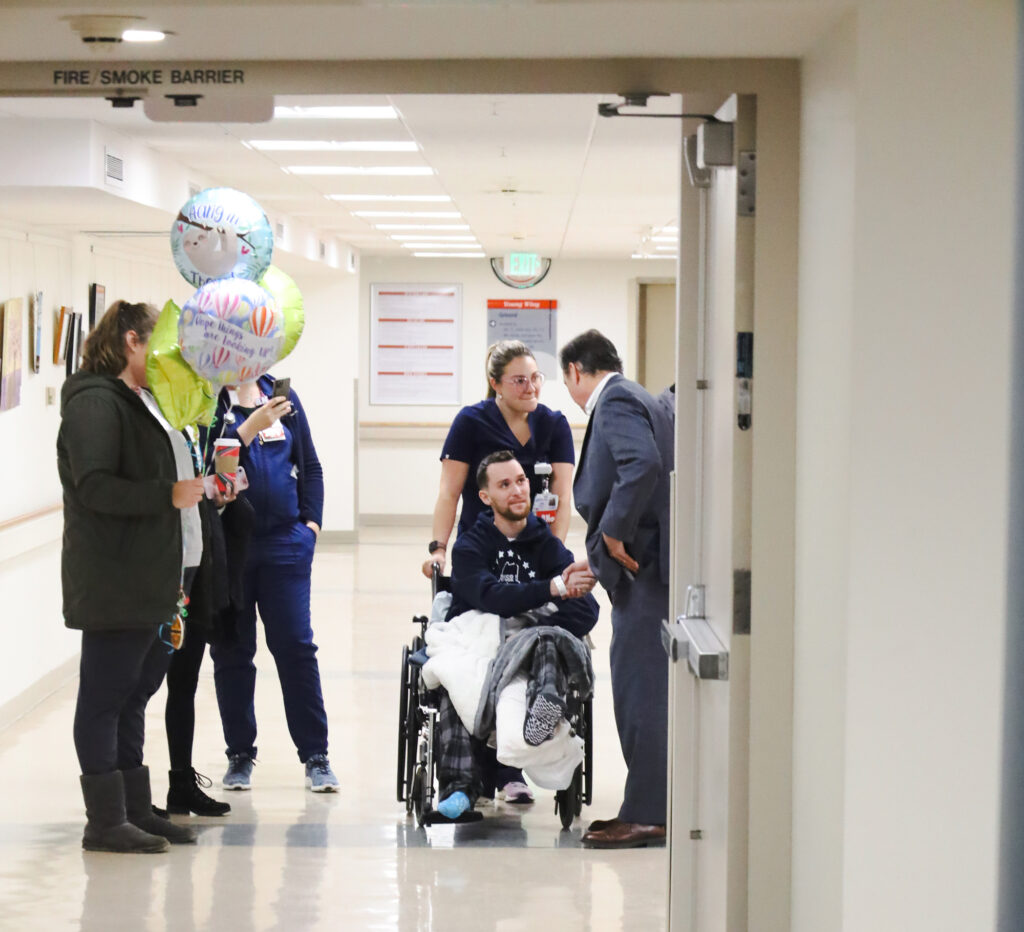


Baby Lena’s Story
Within minutes of their daughter arriving, it was clear that the baby was in distress. She was quickly whisked away to the NICU at CMMC due to complications from fluid in her lungs. Ben and Kim stayed with their little one while she received care in the NICU for a week. Family members watched their older son. The baby recovered and the family was able to head home together.
Ben and Kim are grateful for all of the doctors and nurses who cared for their daughter with compassion and provided them comfort during a stressful time. Today, their baby girl is thriving, and she and her older brother are seen regularly at Central Maine Pediatrics.
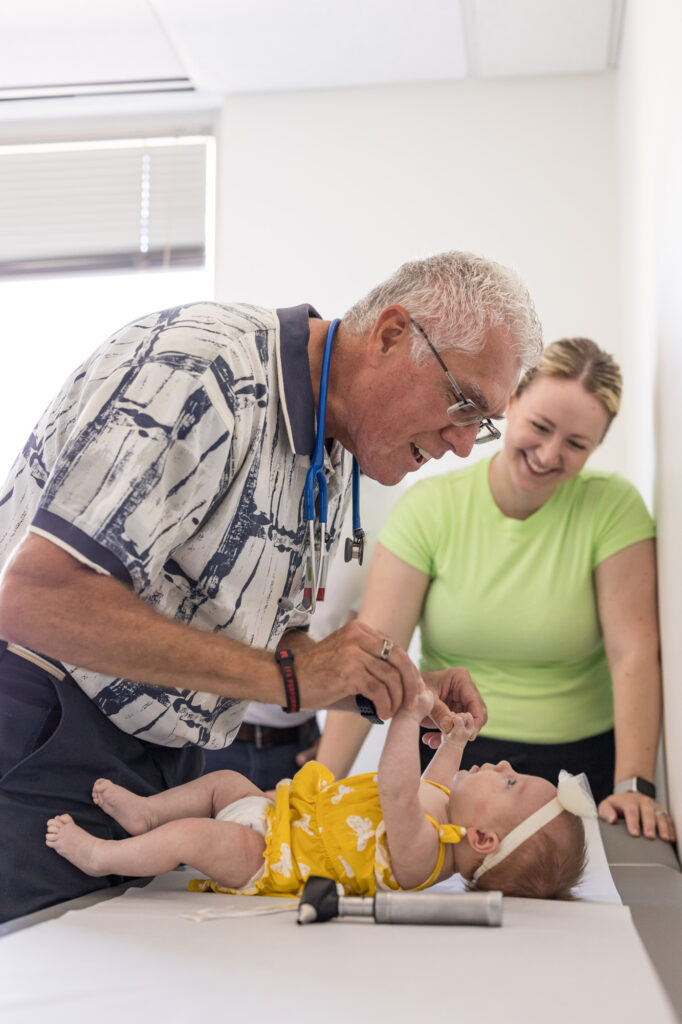

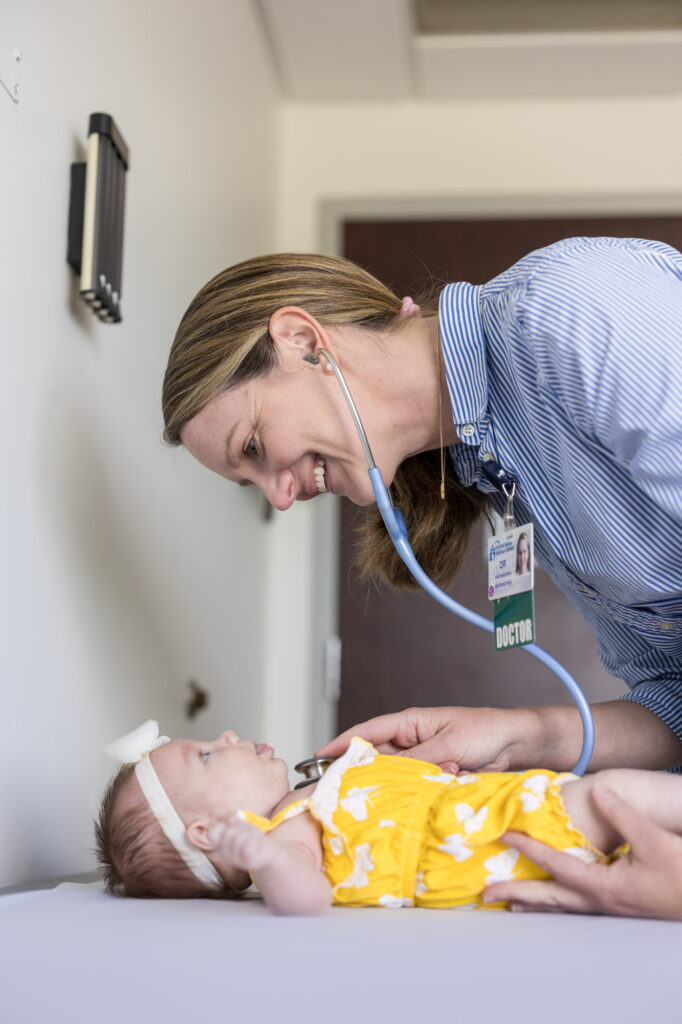
Pharmacy
Assisting You with Your Medication Needs: The CMMC Pharmacy is open to the public and accepts all major insurance plans. As part of your healthcare team, let our pharmacy assist you with managing your medication needs. The CMMC Pharmacy can transfer prescriptions from other pharmacies with a simple request in person or by phone. Our professional team members provide friendly, knowledgeable service in a convenient location. We are your community pharmacy.
Located on the CMMC Campus:
12 High Street (Lobby), Lewiston
Hours of Operation:
Monday-Friday 7 a.m. to 7 p.m.
Saturday 8 a.m. to 4 p.m.
Sunday – closed
Easy refills: 207-795-7177
Automated Refill Line Available 24/7
CMH Pharmacy App: Convenient & Easy
- Secure messaging with pharmacy team
- Request refills
- Set medication reminders
Sign up at https://patient.rxlocal.com/
Services Offered:
- Patient counseling and education
- Refill reminders
- Text and email alerting systems
- Convenient shipment and pickup options
- Medication Therapy Management
- Immunizations
- Prescription Compliance options (autofill)
For refills, customers may call anytime, using our “refill by telephone” system, by dialing (207) 795-7177. Please remember that the CMMC Pharmacy offers alternative options to ensure that your prescriptions are filled and ready when needed, including auto-refill; auto-sync (where all of a customer’s maintenance medications can be synced to refill on the same day) and mail order (restrictions apply – please call for details).
CMMC Specialty Pharmacy
Our CMMC Specialty Pharmacy helps patients understand their chronic and complex diseases and the medication used to treat them.
Located on the CMMC Campus:
12 High Street (Lobby), Lewiston
Federal 340B Drug Pricing Program
The 340B is a program overseen by the Health Resources and Services Agency (HRSA), a division of the US Department of Health & Human Service. Under 340B, drug manufacturers who wish to participate in the Medicaid and Medicare Part B prescription coverage programs must offer a select list of drugs to qualified healthcare providers at a reduced price. The program, which is not subsidized by the federal government, is intended to allow providers to stretch scarce resources as far as possible to provide more care to patients.
Central Maine Healthcare (CMH) provides comprehensive, integrated healthcare services to a geographically dispersed population and qualifies for the 340B program enabling us to provide additional services to our community.
What 340B Means to CMH and Our Community: Many healthcare services are only partially covered by insurance or not covered at all. Medicare and Maine Care reimburse at rates that are often far below the actual cost to provide care. Savings generated by the 340B drug program help CMH fill the reimbursement gaps from insurance and also supports CMH’s $5.2 Million of free care to needy community members annually.
Examples of Programs Made Possible by 340B
- Reduced prescription costs: Our affiliated outpatient practice areas provide lower costs for eligible medications at CMMC’s retail pharmacy and via mail order.
- Rural Areas: Bridgton and Rumford Hospitals provide full-service chemotherapy and specialty infusion enabling patients to receive the care they need closer to home.
- Central Maine Comprehensive Cancer Center: Located at the Lewiston campus, our integrated, multi-disciplinary cancer program combines a full spectrum of services and medical specialists to diagnose and treat cancer holistically. 340B savings enable us to provide access to the most up to date drug regimens for every patient we see.
- Diabetes & Endocrinology: Working collaboratively with patients, our team of board-certified endocrinologists, certified diabetes educators, registered dietitians along with other specialists create a personalized care plan for each individual.
Maintaining the 340B Program: CMMC adheres to the American Hospital Association’s 340B Good Stewardship Principles. We have an internal 340B Oversight Committee comprised of key leadership members from across the healthcare system. The committee meets at least quarterly to conduct internal reviews to ensure our program meets the US Department of Health & Human Services HRSA program rules and provide guidance for our program’s future direction.
Do I Need to Do Anything to Benefit? The 340B program is not a direct-to-consumer program. The benefits of the 340B program for our community, such as those listed above, automatically apply to CMH patients who receive their care across our system. You do not need to do anything to take advantage of these benefits.
If you value the types of services that this program makes available to our community by requiring drug manufactures to provide drugs to CMH at a discount, be sure to encourage your congressional representatives and senators to continue to support the federal 340B program as an essential part of maintaining the availability of exceptional care for Central, West, and Mid-Coast Maine.



